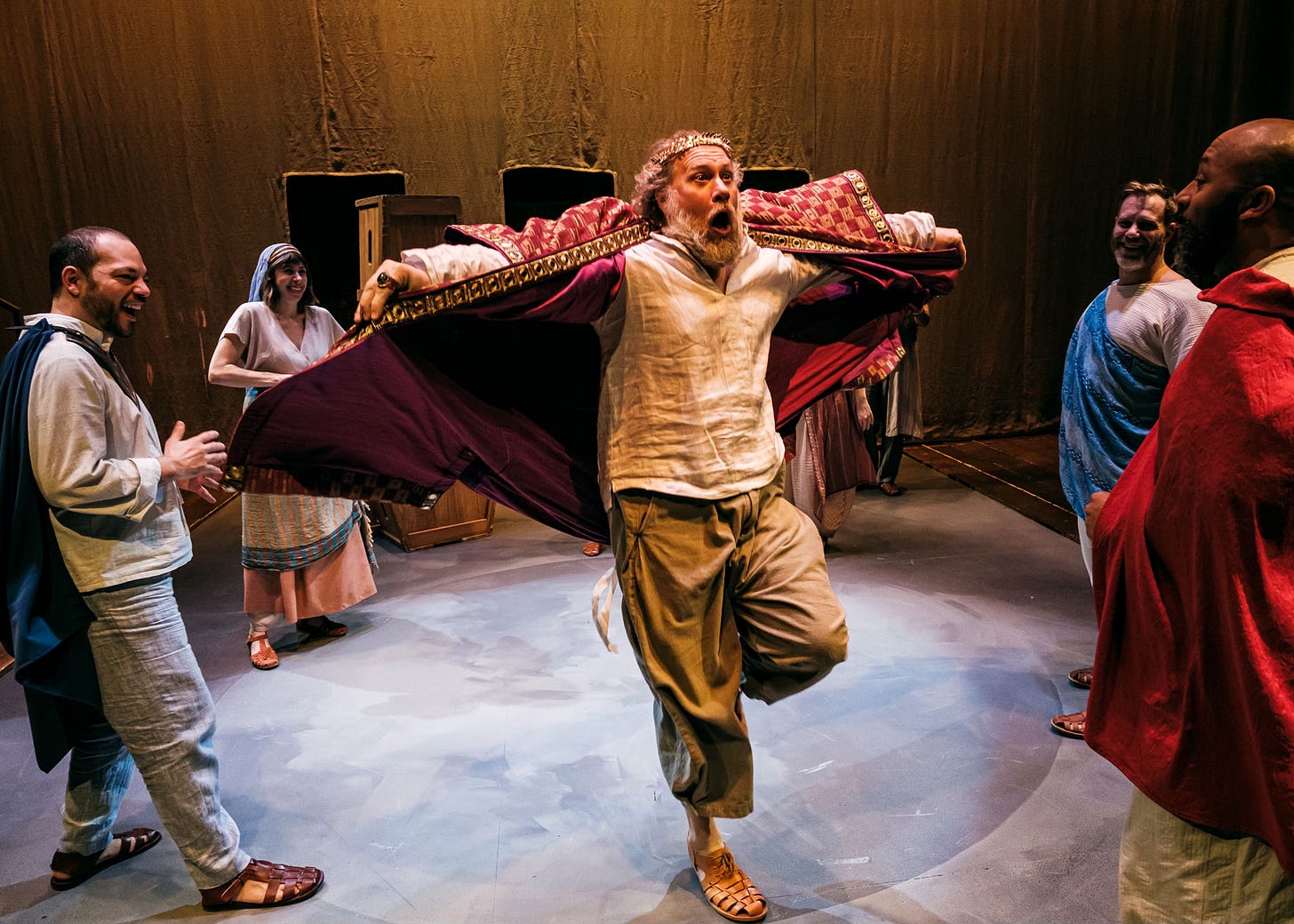Pericles is one of the “minor” works of William Shakespeare. The play didn’t make the cut for the first folio, but you’ll find it in most “Complete Works” compilations, including the one edited by the late David Bevington. Shakespeare wrote it (or collaborated on it, or maybe didn’t even write it) around the time that he was writing King Lear. No matter the provenance, it’s a good little play. But it’s definitely an entertainment. It’s thoughtful, it’s insightful and it’s useful, but it’s not meant to thrust the audience into paroxysms of philosophy the way Hamlet does.
Bevington groups Pericles among Shakespeare’s “Romances,” which include The Winter’s Tale and The Tempest. These are stories, in the oldest sense. They often feature exotic (and fast changing) locations, sea voyages, mistaken identities, magic, miracle and mythology. There is a “story time,” element to these plays. Pericles features a narrator named Gower, who frames all of the action for us, and the atmosphere of the production that Middlebrow, The Scholar Wife and Renaissance Son saw at the Classic Stage Company last week was like a medieval storytelling.
Gower begins with an apology. We are a sophisticated, Elizabethan audience, he tells us, so we might be a step ahead of the play’s simple, Jacobean meter. For an audience in 2024, there’s no apology necessary. The troupe from The Fiasco modernizes the play a bit, to be sure we can follow all of the action, and Pericles is an action-driven play. This is the Shakespeare of pirates and poison, not soliloquies.
Our story is set in Ancient Greece. Pericles, the Prince of Tyre, is in Antioch where the King, Antiochus, is engaged in an incestuous relationship with his daughter. To protect his secret, the King has agreed to marry is daughter off to any suitor who can figure out the answer to an impossible riddle, though the answer itself reveals the incest and shame. Antiochus seems bent on revealing his own secret (and his own destruction) as Pericles even demure to answer at first, “Great King,” he says, “Few love to hear the sins they love to act.”
Pericles does answer the riddle an Antiochus resolves to kill him for it. Pericles flees home to Tyre, with an assassin in pursuit. At Tyre, he is advised to travel the world, to outrun and outwit the killers Antiochus has sent for him. What follows is an episodic tale of adventure where Pericles rescues the kingdom of Tarsus from famine, marries, has a child, loses both and eventually reunites with them in the Temple of Diana, goddess of chastity. There are storms, pirate raids, brothels, poisons, medicines, sword play and politics in between it all. The story moves quickly, from point-to-point, with Gower guiding us the whole way. In the Fiasco Theatre production, we also get musical interludes to help us along.
The effect, and the theme, is a lot of Voltaire’s Candide, which also features people driven from the safety of home and forced to wander. A major theme, embodied in the play by Diana (who looms over the story but is not in the Fiasco production), is how people maintain dignity in the face of life’s trials. Marina, who is Pericles’ daughter, is kidnapped by pirates and sold into prostitution. A well-spoken virgin, she manages to convince each and every customer, including the Governor of Mytilene, not to exploit her and even to better themselves morally. At the end of the play, Gower wishes that everyone in the audience, no matter what life has thrown at them, will similarly triumph through a combination of patience and faith, later echoed in Voltaire’s advice that we stop worrying in favor of cultivating our gardens.
To underscore the play’s universality, the Fiasco actors hand off the role of Pericles throughout the production, giving men and women opportunities to portray the prince in moments of bravery, fear, triumph and despair. The troupe also transforms the versatile Classic Stage theater into a three quarter thrust that mimics a smaller-theater performance from the Elizabethan era. Though the lighting rig is modern, the music and sound design is entirely organic, with set and costume changes performed by the company, as part of the action. Transitions are seamless and the show is always moving. Through smart dramaturgy, we’re presented with a story told in a taut two hours, with a ten minute intermission.
Pericles plays through March 24th and The Middlebrow highly recommends it for people who live in the area or are visiting the city. It’s vibrant Shakespeare, smooth and contemporary that also serves to remind us that Elizabethan’s enjoyed a diversity of entertainments and that we humans haven’t changed so much in the last few hundred years as we might imagine.



I will pass this along to my younger son, 30, who is a self-described theater nut. I assume you're in NYC as am I. If you ever wan to get together IRL, let me know. I'm trying to have more IRL interactions with fellow writers. We had an unofficial gathering of about 30 writers at our home in January, and it was so much fun.
my email is robertsdavidn@gmail.com
I'm enjoying the echoes of the Belasco Theater in Fiasco. Intentional? This play sounds like a romp!